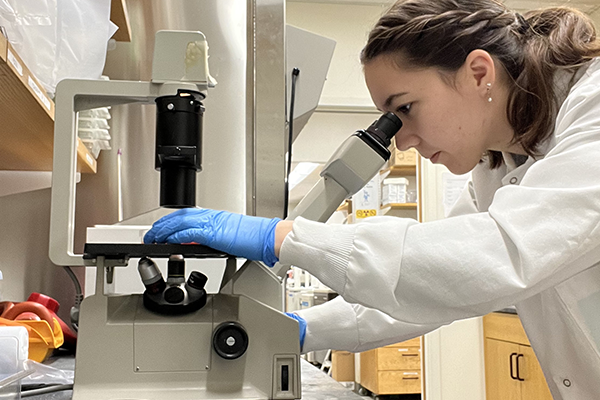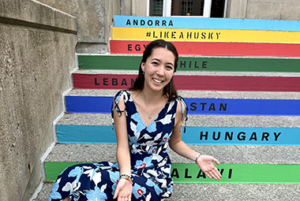Searching for a Cure to Cancer on Co-op

Student
The three co-op experiences and capstone project of Jessica Chen, E’24, bioengineering, has solidified a love for cell culture and the cellular parts of bioengineering. She had co-ops at Gentuity, a medical device company; Ensoma, a biotech company; and through the CaNCURE program at Northeastern, that places undergraduate students in cancer nanomedicine positions in Boston.
Ever since taking AP biology in high school, Jessica Chen, E’24, bioengineering, has been fascinated by what’s going on inside the human body. She says, “After I took that class, I thought about what to major in and what college to go to. I learned that bioengineering was a field that was a good intersection of my interests in math, biology, and science.”
Chen enjoyed her class in Experimental Systems and Synthetic Bioengineering. She says, “It introduced me to a lot of concepts, designing plasmids and doing gene editing, which gave me a good basis for my co-op. It was my first entirely lab-based class and Professor Elizabeth Libby was a great professor.” Other professors have been mentors for Chen, including her capstone advisor Helen Markewich. “I had her as a lab professor in one of my earlier classes. She was really great, and I enjoyed working with her on capstone.”
Chen’s capstone team is tasked with optimizing the chemotaxis of HL-60 cells, which are cells that act like neutrophil cells and are easier to experiment on. Chemotaxis is how neutrophils migrate to a source of injury in the body to go fix it.  She says, “It’s important to make sure they perform that function correctly at all times. When there’s a heavy source of injury in the body, they can get confused, our project is meant to do some more work on how we can optimize that chemotaxis process.”
She says, “It’s important to make sure they perform that function correctly at all times. When there’s a heavy source of injury in the body, they can get confused, our project is meant to do some more work on how we can optimize that chemotaxis process.”
During her co-ops, Chen has explored research further. Her first co-op at medical device company Gentuity involved work on high frequency optical coherence tomography (HF-OCT) with a microimaging catheter to help doctors visualize the inside of blood vessels. She says, “I was doing software assurance testing there: making sure that all the new versions of the software looked good with no bugs or issues and that new features worked well. It was a valuable experience learning about the medical device industry, verification testing, and documentation.”
A second co-op, with biotech company Ensoma, focused on optimizing the cell culture and production process for one-time in vivo editing of blood stem cells, testing for variables such as incubator settings and flask rotation speeds. “It was my first lab job and I definitely learned technical skills as well as documentation and time management.”
Now on her third, Chen works through the CaNCURE program at Northeastern, an undergraduate research program that places students in cancer nanomedicine positions in Boston. “I’m with Judy Lieberman’s research lab at Boston Children’s hospital. One of their projects studies a specific type of inflammatory cell death called pyroptosis that plays a role in control of certain diseases, cancers for example. One of the major players is a type of enzyme called Caspase-4, I’m trying to identify additional substrates of Caspase-4.”
Chen’s co-op experiences and her capstone project have solidified a love for cell culture and the cellular parts of bioengineering. She is proud of her work as a cancer researcher. “Cancer is a huge problem, and we need as many people working on it as possible. Getting a glimpse into the research has been interesting and there’s a lot of important work being done, contributing a small part is important to me.” She plans to further her education by finishing out strong at Northeastern and building lab skills while she looks at PhD programs.
Outside of working towards a cure, Chen is active as president of Northeastern’s Mixed Student Union organization. “MSU is for anyone who identifies as mixed race, mixed identity, mixed culture; I’m half Irish and half Taiwanese. It’s a great group, we do social activities and discussions on our experiences. We tackle aspects of being mixed. It’s a safe space for me that I really enjoy.”